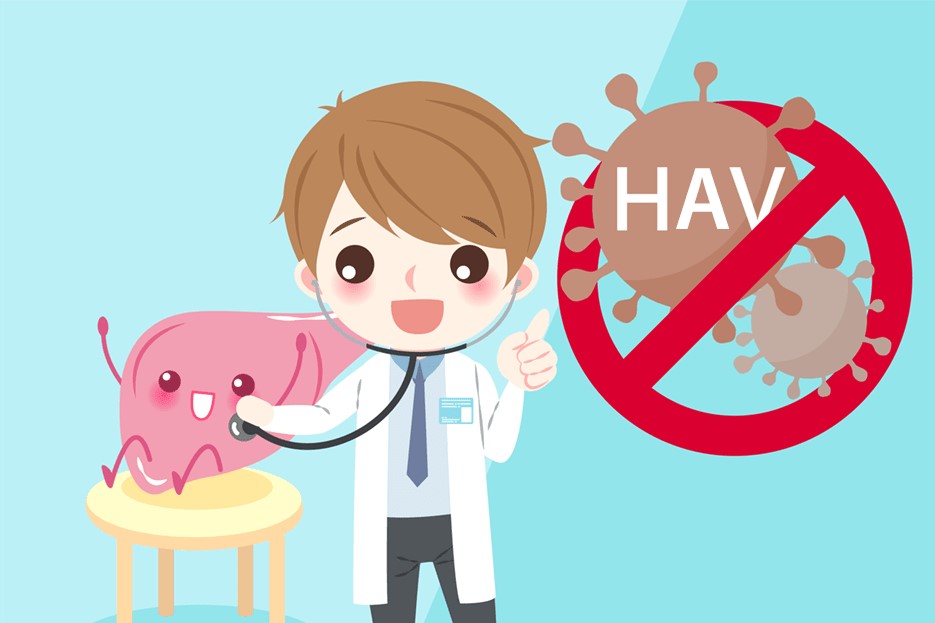
What causes hepatitis A and how to treat it
Hepatitis A and more. Not everyone knows that there is more than one type of hepatitis: the term ‘viral hepatitis’ refers to a group of infectious diseases caused by 5 different viruses (HAV, HBV, HCV, HDV and HEV), which cause inflammation of the liver
What is hepatitis A?
Hepatitis A is an acute infectious disease caused by a virus (HAV) that replicates in liver cells.
HAV is a picornavirus and is the most common cause of acute viral hepatitis, which is particularly common in children and young adults.
According to the latest data made available by SEIEVA (Sistema Epidemiologico Integrato delle Hepatiti Virali Acute), coordinated by the Istituto Superiore di Sanità (ISS), the number of cases of hepatitis A decreased in 2020: from an incidence of 0.8 cases per 100,000 inhabitants in 2019 to 0.2 cases per 100,000 in 2020.
This is probably due to reduced social contacts as a result of the containment measures for the Covid-19 pandemic, which also helped to decrease the risk of contracting other infectious diseases.
“But, in recent years in Italy, it is worth remembering that the reduction in hepatitis A infection, especially among children, is mainly due to higher hygiene and health standards, which are essential to fight the spread of the infection,” says the professor.
Virus transmission
“Although the number of cases of hepatitis A is declining, the level of attention to the disease must remain high.
In order to prevent the risk of infection, it is necessary to know how the virus is transmitted, which occurs via the faeco-oral route: contact with an undetectable quantity of infected faeces causes infection in unvaccinated individuals who have had no previous contact with the virus,” the expert explains.
Hepatitis A risk factors
It is therefore essential to pay attention to risk factors, which can be identified by
- ingestion of infected food such as raw seafood, vegetables and anything else fertilised with black water;
- contaminated water sources;
- unprotected sex, especially in the case of oral-genital practices;
- poor personal hygiene, especially before/during food preparation;
- travel to endemic areas;
- contact with infected persons.
With regard to the latter, it should be remembered that a person is infectious 7-10 days before the onset of hepatitis symptoms, and jaundice and faecal excretion of viral particles can usually continue for weeks afterwards.
Symptoms
The disease has an incubation period of 15 to 50 days and may run without specific symptoms, especially in children (70% of cases).
“Symptoms of viral hepatitis A,” continues Prof. Colombo, “include in the early phase
- joint pain;
- fever.
Later, it manifests itself with:
- lack of appetite, transient nausea, sometimes accompanied by vomiting;
- general malaise and tiredness;
- itching.
Especially in adults, the disease is more severe and can cause jaundice, i.e. a yellowish discolouration of the skin, sclerae (the white part of the eye) and visible mucous membranes, due to the accumulation of bilirubin in the blood caused by liver failure,’ says the professor.
Symptoms persist from 2 to 10 weeks, the course is benign in most cases, with:
- complete resolution of liver damage;
- permanent immune protection against reinfection.
How it is diagnosed and treated
Diagnosis requires a simple blood test, the dosage of IgM antibodies against the virus.
Treatment consists of
- clinical surveillance;
- effective hydration and nutrition until spontaneous recovery.
In very rare patients, mostly with pre-existing liver disease, hepatitis A requires life-saving treatment.
Prevention of hepatitis A
Hepatitis A prevention is based on a dual approach: the vaccine and compliance with hygiene rules.
The vaccine
The effective and well-tolerated vaccine against HAV prevents infection at any age.
It is administered intramuscularly and is available in Italy in both monovalent and combined forms, in combination with the anti-hepatitis B vaccine.
Vaccination is recommended for people at risk, i.e. those who:
- live in or have to visit endemic regions;
- suffer from chronic liver disease
- are family members or contacts of persons infected with hepatitis A;
- are users of illegal substances.
Hygiene rules
“It is also possible to avoid contagion through some general hygiene rules such as:
- do not consume raw seafood;
- washing fruit and vegetables carefully;
- not drinking well water;
Transmission of the infection is prevented by always washing your hands thoroughly, especially during intimate hygiene and before handling food/drinks,” concludes the expert.
Read Also:
Nobel Prize For Medicine To Scientists Who Discovered Hepatitis C Virus
Hepatic Steatosis: What It Is And How To Prevent It


